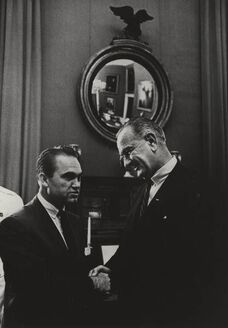BACKGROUND
|
|
George Wallace and the Selma marches
- Preparations
- George Wallace tried to prevent the Selma march on March 7th, 1965 by mobilizing the national guard and telling the national guard to stop them ‘by any means necessary.’
- March 8th, 1965, the day of the second Selma march. George Wallace and his team of the national guard are waiting at the end of the Edmund Pettus Bridge for the ensemble of demonstrators and protesters
- Organization
- George Wallace has recruited the National Guard, local police and anyone else who was willing to get into uniform to help stop the march in its tracks
- Reasons for violence
- Martin Luther King Jr. has driven the idea of non-violence into the idea into the minds of all his allies. MLK rose to power upon the principle of non-violence and has done his best to keep all of his organized events to non-violence. However, March 8th, 1965, has been named Bloody Sunday. This single day would do a couple things for Alabama and its leadership.
- This would cement the public view of George Wallace and his crew
- This would win MLK support from the government, especially President Jackson.
George Wallace Relations

- George Wallace and MLK
- Any tension
- “I am not sure that he believes all the poison that he preaches, but he is artful enough to convince others that he does” (King, “Interview”).
- Martin Luther King described Wallace as “perhaps the most dangerous racist in America today” (King, “Interview”).
- Reasons for tension
- George Wallace and MLK were bound to be enemies because of their stark differences in views.
- George Wallace was taught all through his life that the separation of races was right and was completely convinced that this was the way it was supposed to be
- MLK has always believed that the way the people around him were treated is wrong and that he is the one that is supposed to change that.
- Any tension
- George Wallace and President Johnson
- Interactions
- George Wallace and President Lyndon B. Johnson have had quite a few interactions. However there is one private meeting that has a lot of interest. This meeting was in confidence and there are very few people that know what was said during that meeting. However this was the meeting that had an impact on the Selma marches and it is believed that this meeting could have prevented Bloody Sunday.
- Interactions
George Wallace legacy
- How he was remembered
- Towards the end of George Wallace’s life, he realized what he had done and tries to change his public image. However it is too late and everyone knows who he is and what he has done.
- In some cases he issued public apologies for his actions
- He also claimed that most of his demonstrations and statements were misunderstood and that his actions were in good intention.
- He began to gain support from the African American community
- George Wallace managed to end his governorship on a good note by improving health care, the state’s economy, employment and infrastructure.
- Even with all of this, there was little more that governor George Wallace could have done considering his past and how the media and history portrayed him.
- His family legacy
- From the stance at the schoolhouse door to the National Guard being called in to disperse the crowd of over 600 strong, George Wallace and his family will be remembered for his actions and unfortunately that legacy follows his sons and daughters. Many people tend to overlook his later life and how he would seek reconciliation for his actions. His daughter, who married a Kennedy, has publicly spoken out against her father’s actions and ideals.
